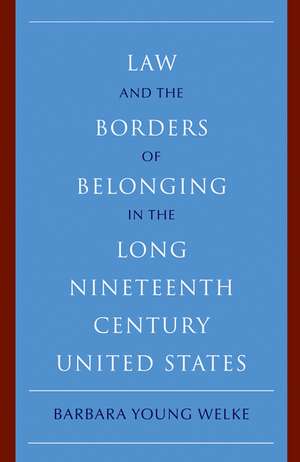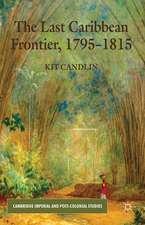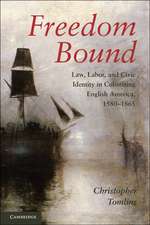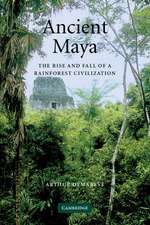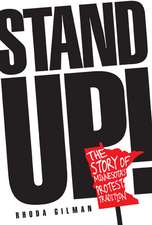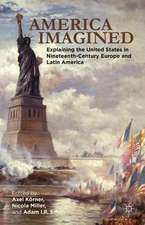Law and the Borders of Belonging in the Long Nineteenth Century United States: New Histories of American Law
Autor Barbara Young Welkeen Limba Engleză Paperback – 7 mar 2010
| Toate formatele și edițiile | Preț | Express |
|---|---|---|
| Paperback (1) | 136.69 lei 3-5 săpt. | |
| Cambridge University Press – 7 mar 2010 | 136.69 lei 3-5 săpt. | |
| Hardback (1) | 567.07 lei 6-8 săpt. | |
| Cambridge University Press – 14 mar 2010 | 567.07 lei 6-8 săpt. |
Preț: 136.69 lei
Nou
Puncte Express: 205
Preț estimativ în valută:
26.16€ • 27.38$ • 21.77£
26.16€ • 27.38$ • 21.77£
Carte disponibilă
Livrare economică 11-25 martie
Preluare comenzi: 021 569.72.76
Specificații
ISBN-13: 9780521152259
ISBN-10: 0521152259
Pagini: 256
Ilustrații: 1 b/w illus.
Dimensiuni: 140 x 216 x 14 mm
Greutate: 0.3 kg
Editura: Cambridge University Press
Colecția Cambridge University Press
Seria New Histories of American Law
Locul publicării:New York, United States
ISBN-10: 0521152259
Pagini: 256
Ilustrații: 1 b/w illus.
Dimensiuni: 140 x 216 x 14 mm
Greutate: 0.3 kg
Editura: Cambridge University Press
Colecția Cambridge University Press
Seria New Histories of American Law
Locul publicării:New York, United States
Cuprins
Introduction; 1. Constructing a universal legal person: able white manhood; 2. Subjects of law: disabled persons, racialized others, and women; 3. Borders: resistance, defense, structure, and ideology; Conclusion: abled, racialized, and gendered power in the making of the twentieth-century American state; Coda.
Recenzii
'A book that 'every historian should read' is a rare phenomenon, but in my estimation this is one of them. Barbara Young Welke's remarkable achievement is to say something original and unexpected about race and gender. By setting both in relation to disability, she shows how these intertwined categories of identity have profoundly shaped the modern understanding of citizenship and legal personhood. That she does so in lucid and often powerful prose is icing on the cake.' Douglas Baynton, University of Iowa
'In this extraordinary book, Barbara Young Welke embraces a revolution in historical understanding that has been elusive, even though in some ways it has long been right before our eyes. Moving past old paradigms and writing with clarity, confidence, and authority, she offers a fresh understanding of the meanings of US citizenship and a truly original narrative of social change in the United States from the founding generation to World War I.' Linda Kerber, University of Iowa
'With clarity and concision, Barbara Young Welke shows the complex ways in which American law drew the lines of membership and citizenship according to physical and mental ability, race, and gender. This is a book of enormous sweep, power, and humanity.' Mae M. Ngai, Columbia University
'Passionate, provocative, powerful: this splendid book should be required reading for everyone who wants to know anything about the history of American law.' Peggy Pascoe, author of What Comes Naturally: Miscegenation Law and the Making of Race in America
'This is a short book with big ideas … powerful analysis leaves no doubt that significant shifts occurred within American legal history, and Welke's interpretive framework … will be pivotal in shaping future inquiries.' Lucy Salyer, American Historical Review
'In this extraordinary book, Barbara Young Welke embraces a revolution in historical understanding that has been elusive, even though in some ways it has long been right before our eyes. Moving past old paradigms and writing with clarity, confidence, and authority, she offers a fresh understanding of the meanings of US citizenship and a truly original narrative of social change in the United States from the founding generation to World War I.' Linda Kerber, University of Iowa
'With clarity and concision, Barbara Young Welke shows the complex ways in which American law drew the lines of membership and citizenship according to physical and mental ability, race, and gender. This is a book of enormous sweep, power, and humanity.' Mae M. Ngai, Columbia University
'Passionate, provocative, powerful: this splendid book should be required reading for everyone who wants to know anything about the history of American law.' Peggy Pascoe, author of What Comes Naturally: Miscegenation Law and the Making of Race in America
'This is a short book with big ideas … powerful analysis leaves no doubt that significant shifts occurred within American legal history, and Welke's interpretive framework … will be pivotal in shaping future inquiries.' Lucy Salyer, American Historical Review
Notă biografică
Descriere
This book offers a new paradigm of liberal selfhood and citizenship from the founding of the United States through the 1920s.
